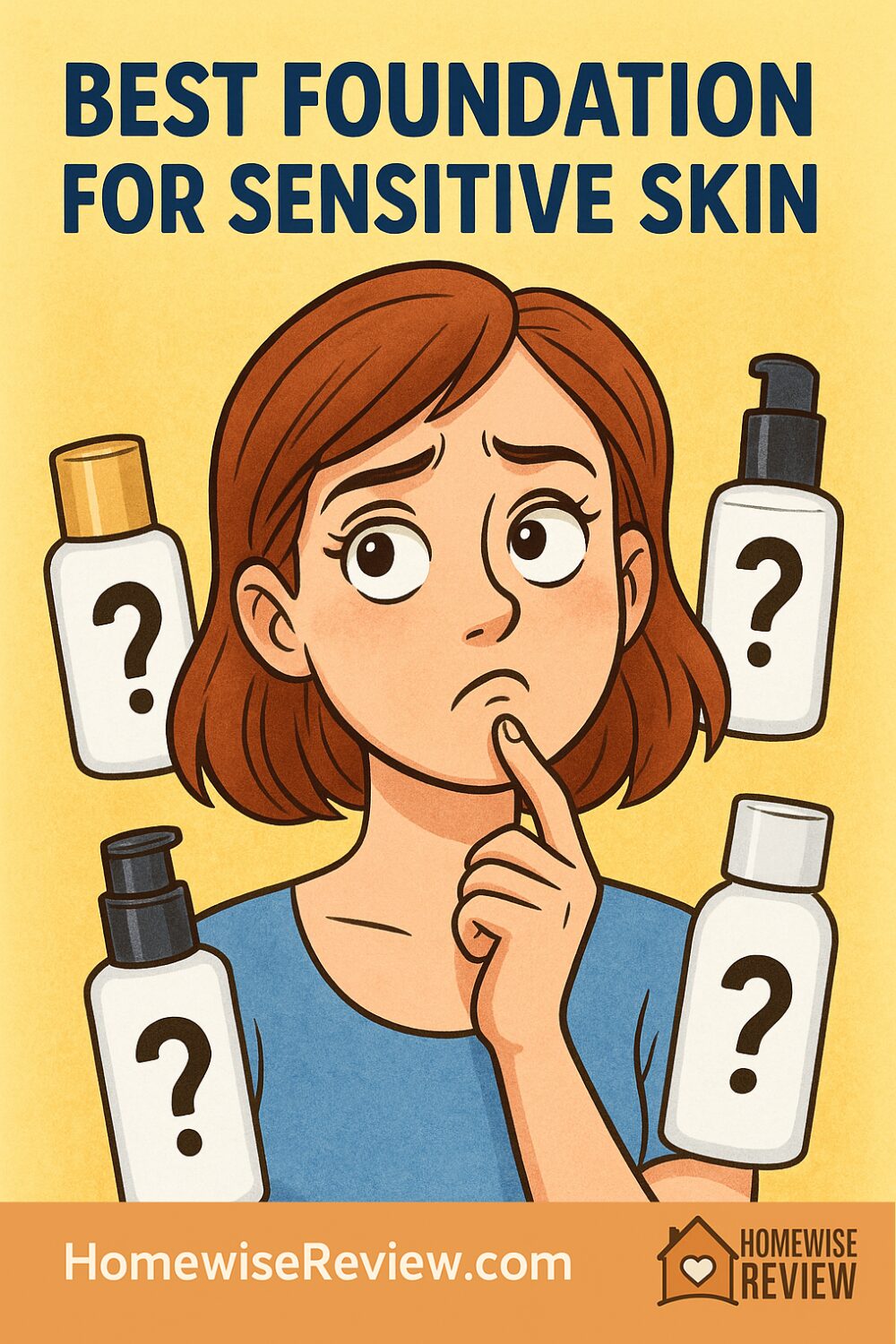
Finding the perfect foundation when you have sensitive skin can feel like a never-ending battle. You carefully apply a new makeup, only to end up with stinging, red patches or breakouts by midday. Many with sensitive complexions know the frustration of foundations that look great but are full of fragrances, alcohol, or harsh additives that trigger irritation. It matters because foundation is supposed to boost your confidence—covering redness, evening out tone—not make your skin angrier. If you’ve ever felt like you’re navigating a minefield of reactions, you’re not alone. The good news? There are gentle, high-performing foundations out there that can give you coverage without the drama.
In this guide, we’ll spotlight three top-rated foundations that beauty experts and dermatologists often recommend for sensitive skin. These picks avoid common irritants and have soothing benefits, so you can wear makeup comfortably. We’ll also share what makes each one great for reactive skin, along with honest pros and cons (because nothing is perfect!). Finally, don’t miss our tips in the “What to Know Before Buying” section on how to choose and test a foundation for sensitive skin. Let’s help you find a foundation that loves your sensitive skin as much as you do!
Our Top Picks for Sensitive Skin-Friendly Foundations
1. Cover FX Total Cover Cream Foundation — Full-Coverage, Gentle Formula in a Compact
This dermatology-developed cream foundation doubles as a concealer, delivering full coverage in a fragrance-free, skin-loving formula. It comes in a handy compact and provides a radiant, second-skin finish that covers redness, blemishes, or discoloration with ease.
Why it’s great for sensitive skin: Cover FX’s formula was originally created in a hospital dermatology clinic for patients with sensitive skin. It’s free of common irritants (no fragrance, parabens, talc, or mineral oil) and loaded with antioxidants like vitamin E and soothing ingredients like bisabolol. That means you get high-pigment coverage without the usual culprits that cause flare-ups. With over 40 inclusive shades, it’s easier to find a perfect match so you don’t have to mix (which can sometimes irritate skin less if you stick to one product).
Pros:
- Serious coverage: Highly pigmented cream hides redness and spots, often eliminating the need for a separate concealer.
- Sensitive-safe ingredients: Formulated without fragrance, parabens, talc, or mineral oil, reducing risk of irritation.
- Shade variety: ~40 shades with an undertone-based system, so sensitive skin of all tones can find a close match.
Cons:
- Thick texture: The rich cream can look heavy or cakey if over-applied – a little goes a long way (buff it in well).
- Prep needed for dry spots: On very dry or flaky patches, it may catch or emphasize texture unless skin is well-moisturized first.
Rating: 4.3/5 (a top choice for full coverage lovers with sensitive skin)
2. BareMinerals Original Loose Powder Foundation SPF 15 — Minimalist Minerals, Trusted by Derms
A true classic, BareMinerals Original is a loose mineral powder foundation made with only five clean ingredients. It provides buildable sheer-to-medium coverage with a naturally luminous finish. This powder feels weightless and lets your skin breathe, which is a huge plus when your skin tends to react to heavier makeup.
Why it’s great for sensitive skin: With no talc, binders, fillers, or added fragrance, this formula is about as simple and hypoallergenic as it gets. Dermatologists have recommended BareMinerals for decades to patients with sensitive or acne-prone skin because it doesn’t clog pores or cause flare-ups. In fact, many people with rosacea or post-procedure skin find this powder calming since it lacks the preservatives and oils that can irritate. It also contains zinc oxide and titanium dioxide (natural mineral sunscreen ingredients) for a modest SPF 15 protection, adding a bit of environmental defense without chemical filters.
Pros:
- Ultra-clean formula: Only 5 mineral ingredients – no fragrance, no chemicals – greatly minimizing chances of irritation or allergy.
- Breathable coverage: Lets skin breathe and is non-comedogenic, so it won’t clog pores or worsen redness; ideal for sensitive, breakout-prone skin.
- Natural finish: Buffs into a smooth, your-skin-but-better look that doesn’t cake, and you can layer it for more coverage as needed.
Cons:
- Learning curve: As a loose powder, it can be a little messy and requires a good buffing technique (swirl-tap-buff) for best results.
- Not for extreme dryness: If you have very dry, flaky skin, this powder can cling to patches – prepping with moisturizer is a must (or consider a hydrating liquid instead).
- Minor itch for a few: A small fraction of users notice slight itchiness, especially if sweating, due to the natural minerals. It’s rare, but always patch-test since even gentle ingredients can bother super sensitive folks.
Rating: 4.7/5 (a longtime fan-favorite for sensitive and acne-prone skin)
3. IT Cosmetics Your Skin But Better CC+ Cream with SPF 50+ — Multi-Tasking Miracle for Redness
Part foundation, part skincare, part sunscreen – this cult-favorite CC cream does it all. IT Cosmetics CC+ Cream is a full-coverage color-correcting cream that comes in a tube with a convenient pump. It has a creamy, moisturizing texture that covers redness and uneven tone while imparting a natural glow. You get broad-spectrum SPF 50 protection and a cocktail of skin-loving ingredients in each application.
Why it’s great for sensitive skin: This product was developed with plastic surgeons and dermatologists, aiming to be gentle enough for those with rosacea, sensitivity, or post-procedure skin. It uses physical UV filters (zinc oxide and titanium dioxide) for sun protection, which tend to be kinder on reactive skin than chemical sunscreens. The formula is also packed with hydrating and calming additives like niacinamide (to soothe redness), hyaluronic acid (to plump and hydrate), peptides and collagen (to support skin barrier). Many sensitive users love that it provides serious coverage and sun protection in one step, simplifying their routine and reducing how many products they need to layer (fewer products can mean fewer irritation chances).
Pros:
- One-and-done coverage: Delivers the coverage of a foundation with the texture of a CC cream – effectively conceals redness, blotchiness, or acne marks without needing separate layers.
- Skincare + SPF benefits: Mineral SPF 50 shields sensitive skin from UV rays; plus niacinamide and antioxidants help calm and improve skin over time.
- Dewy, healthy finish: Leaves skin looking plump and glowing, not flat. It keeps many sensitive (even mature) skins comfortable and moisturized throughout the day.
Cons:
- Can get shiny on oily skin: Those with oily or combination sensitive skin may find the formula a bit rich – it can look greasy without a setting powder or the oil-free matte version.
- Scented with botanicals: There’s no added perfume, but it does contain citrus extracts which give a light scent. Extremely reactive skin or fragrance-allergic users might need to patch test to be sure it’s tolerated.
- Shade nuances: The shade range covers fair to deep, but the undertones lean warm/neutral. If you have a very cool or olive undertone, finding an exact match can be tricky and you may need to tweak it with setting powder or bronzer to get it just right.
Rating: 4.6/5 (Overall skin-loving superstar!)
See our full IT Cosmetics CC+ Cream Review for a detailed breakdown of this foundation.
What to Know Before Buying a Foundation for Sensitive Skin
Choosing the right foundation is about more than shade and coverage when you have sensitive skin. Keep these tips in mind before you buy:
Check the Ingredients
Flip that bottle or compact over and scan the ingredient list. Avoid known irritants like added fragrances (a top trigger for redness and contact dermatitis), drying alcohols (often listed as “SD alcohol” or “denat.” alcohol, which can strip moisture and cause irritation), and harsh preservatives or chemical sunscreens if you know they bother you. The simpler the formula, usually the better for sensitive skin. Look for keywords like “hypoallergenic,” “fragrance-free,” “non-comedogenic,” and “dermatologist tested.” Foundations labeled for sensitive skin or mineral formulations tend to omit common irritants. Also, consider beneficial ingredients: foundations infused with soothing agents (like aloe, chamomile, niacinamide, or centella asiatica) or anti-inflammatories can actually help calm your skin while you wear them.
Consider the Formula and Finish
Your skin type (dry, oily, combo) plus sensitivity level should guide the type of foundation you choose. If you’re on the drier or eczema-prone side, a moisturizing liquid or cream foundation with a natural or dewy finish will be kinder – matte powders can cling to flakes and make irritation more visible. On the other hand, if you’re very oily and sensitive, you might prefer an oil-free liquid or mineral powder that lets skin breathe and controls shine (many with oily yet sensitive skin do well with pure mineral powder foundations because they have no heavy oils or silicones). Avoid ultra-matte, full-dry-down formulas if your skin gets red and irritated easily; a bit of luminosity or satin finish tends to look healthier on sensitive skin. Tip: Always match your foundation to your current skin needs – for example, in winter when sensitive skin is drier, you may switch to a more hydrating formula, then use a lighter powder or tint in humid summer months.
Patch-Test and Observe
When your skin reacts at the drop of a hat, patch-testing is your best friend. Before applying a new foundation all over your face, do a little test: dab a bit along your jawline or on your neck (someplace you can cover if a reaction happens) and watch for 24–48 hours. If you experience burning, redness, or little bumps, you’ll know this one’s a no-go before you’ve put it everywhere. If you’re in a store, you can also swatch a stripe on your inner arm – the skin there can show reactions similarly. Don’t skip this step, especially with formulas that have longer ingredient lists. Additionally, try to introduce only one new product at a time. That way if irritation strikes, it’s easier to pinpoint the cause. And remember, even when a foundation is labeled “safe for sensitive skin,” each person’s triggers are different – so a quick patch test is the safest way to find out how your skin will respond. Lastly, keep your receipts and check return policies: many beauty retailers allow returns of gently used products, so if a foundation doesn’t agree with your skin, you can often return it rather than forcing it (your face will thank you!).
See Also:
For more on complexion picks and skin-friendly makeup, you might enjoy our in-depth Estée Lauder Double Wear Stay-in-Place Foundation Review – a classic long-wear option that many sensitive users rely on. Also, check out our full IT Cosmetics CC+ Cream Review for additional insights on that all-in-one formula. If you’re dealing with dryness along with sensitivity, don’t miss our Best Foundation for Dry Skin guide, which covers hydrating foundations and tips to keep flaky, reactive skin looking flawless. We also have a guide for Best Foundation for Large Pores.
Here’s to finding your perfect match and finally enjoying foundation again!




